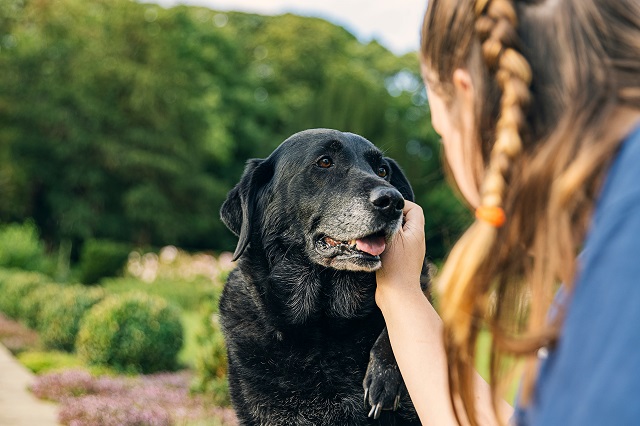Arthritis is one of the most common health conditions found in Labradors. Several disorders, age-related wear and tear, or certain injuries can contribute to this condition. In addition to chronic inflammation in their joints, your Labrador may experience abnormal changes due to this painful condition.
If you are a responsible lab owner, you’ll want to find a suitable treatment for them before it becomes severe.
Although many types of treatment are available for treating arthritis in dogs, you may still prefer treating them naturally to avoid side effects. In this article, you will find information about natural treatments for arthritis in dogs?
What is arthritis in your Labrador?
Joint stiffness and discomfort usually cause inflammation and pain in Labradors. Arthritis is the most common condition that this causes. The condition may occur because of changes in the joint’s cartilage, reduced smoothness of damaged joints, or the rubbing of joint bones together.
In addition to being painful and uncomfortable, this issue can damage the cartilage in the bones and joints. The formation of new bones or increased friction in the joints can cause stiffness in your Lab’s joints, making it difficult to move.
Labradors can develop arthritis at a young age for various reasons, including joint development and some problems in the bones. In most cases, arthritis will affect one or more joints in your Lab, depending on the cause. Here are a few common causes of arthritis in Labradors:
| Instability in joint |
| Traumatic damage in bones |
| Abnormal development or damage in cartilage |
What are the symptoms of arthritis in Labradors?
The main symptoms of arthritis in Labradors include:
| Stiffness or lameness while moving after a long rest | Deterioration in a movement when damp or cold |
| Stains of saliva on joint due to licking them | Aggressive behavior when lifted |
| Moves slower than usual | Unwillingness to exercise |
Visiting a veterinarian is the best way to determine whether the joints in your Labrador are affected by arthritis by looking at the extension and flexibility of the joints. In addition to confirming arthritis, your vet will help you determine the underlying cause. Also, he may suggest specific tests like blood tests to get a fuller understanding of the problem.
What natural herbs and remedies help with arthritis in dogs?
There are many herbs and alternative remedies that can be used to treat your Labrador’s arthritis.
Natural Herbs and Supplements for dog Arthritis.
You can treat arthritis in your Labrador with various supplements and natural herbs. It is best to consult a Vet to find the right product for your Lab because different types of natural herbs work differently on different types of arthritis.
It is important that your veterinarian knows how to prescribe herbal medicines if you choose this. Chinese herbal remedies like Corydalis and Ligusticum can relieve arthritis pain and strengthen the hind legs of your Labrador dog with arthritis.
Some experts believe that herbs such as Boswellia and turmeric and omega-3 fatty acids found in sardines, flaxseed oil, or krill can be the best treatments for arthritis in dogs.
Certain supplements containing chondroitin, MSM, and glucosamine can also replenish and nourish the cartilage in the joints. Adding bone broth to your Lab’s diet can also help protect its joints and cartilage from arthritis.
Acupuncture for arthritis in Labradors
Several acupuncture treatments have also been reported to relieve pain in your Labrador caused by arthritis. Dogs can benefit from acupuncture’s ability to provide lasting relief and to help them regain body balance. In addition, it releases endorphins and cortisol, which increase blood flow and relieve muscle spasms.
Other natural treatments for arthritis in Labradors
A holistic vet may also recommend the following other natural treatments for arthritis in dogs besides supplements, herbs, and acupuncture:
| Laser therapy of low level: Light of a certain wavelength can relieve arthritis pain in Labrador. It can also reduce swelling, increase circulation, and speed up the healing of wounds, along with reducing pain. |
| Assisi Loop: Dogs can benefit from this FDA-approved prescription treatment at home, which works like laser therapy but improves the natural anti-inflammatory process of the body. |
| Targeted Pulsed Electromagnetic Field Therapy or TPEMT: To facilitate faster healing of hard and soft tissues like tendons, skin, organs, and bones, it can increase nitric oxide production in its body. |
| Aquatic massage therapy: Moreover, it can also alleviate the pain associated with arthritis. Following the instruction of a professional massage therapist, pet parents can apply this massage technique themselves. By using this therapy, dogs can reduce stress, release endorphins, and reduce trigger points. |
| Lose weight: By helping them lose weight, dogs with arthritis can remain active. By encouraging your Labrador to swim or run on an underwater treadmill, you can help build their muscles. |
Diet and Weight Management for Managing Arthritis in Labradors
According to several veterinarians, obesity is one of the main causes of arthritis in dogs. Dogs with chronic inflammation caused by arthritis can benefit from a balanced and healthy diet to manage and recover from it.
According to experts, fresh food such as homecooked or raw foods should always be given to dogs, depending on their breed. Dogs should be given probiotics to help digest their food properly to reduce inflammation in the body.
Nevertheless, you must consult your veterinarian before feeding your dog home-cooked or raw food as it may not contain enough nutrients.
Excess weight can put more pressure on the joints in arthritic dogs; you can also reduce their weight to ease their pain. Reducing their weight can also keep their joints active.
Playing games or walking with your dog can keep him active even if he has difficulty moving.
By making some lifestyle changes or changing their dog’s diet, pet parents can help their dogs reduce the discomfort and pain caused by arthritis.

Does CBD help Labrador dogs with arthritis?
Research has shown that CBD can significantly relieve arthritis pain in dogs when given the right dosage twice a day.
CBD is effective against certain inflammatory conditions by acting as an anti-inflammatory drug. Arthritis, in particular osteoarthritis, is a relatively common condition in dogs.
An estimated 60% of dogs suffering from arthritis suffer from osteoarthritis in varying degrees. CBD in the right dosages can be very effective in reducing arthritis-induced inflammation.
When to see a holistic Vet about dog arthritis?
If you are using natural remedies to treat your dog’s arthritis, you need to consult a holistic vet.
The search for a good holistic vet may not be as straightforward as it appears, as very few holistic veterinary clinics are registered with the AHVMA or American Holistic Veterinary Medical Association. The AHVMA website is a good place to find the most suitable holistic veterinarian near you if you have a dog with arthritis.
When to euthanize a Labrador with arthritis?
When your dog is subjected to serious illnesses like arthritis or injuries, or when they grow old, you may be forced to euthanize them.
As euthanizing a dog is not an easy process, you should consult your veterinarian before making a final decision. He will observe the dog’s attitude and behavior before guiding you on when to euthanize them. The following facts may influence your decision:
| Chronic pain that cannot be controlled with medication |
| Falls while trying to walk or cannot stand independently |
| Lose interest in most of their favorite activities like playing, eating, walking, attracting others’ attention, etc. |
| Soiling themselves frequently |
| A persistent problem in coughing or breathing |
| You have to force your dog to eat, or he has stopped eating |
| Diarrhea or frequent vomiting to cause significant weight loss or dehydration |
Conclusion
You can use several natural treatments to treat arthritis in dogs naturally.
You must consult your veterinarian before using any of the treatments listed in this article. He can guide you on which treatment is best for your dog after observing their attitude and behavior.


